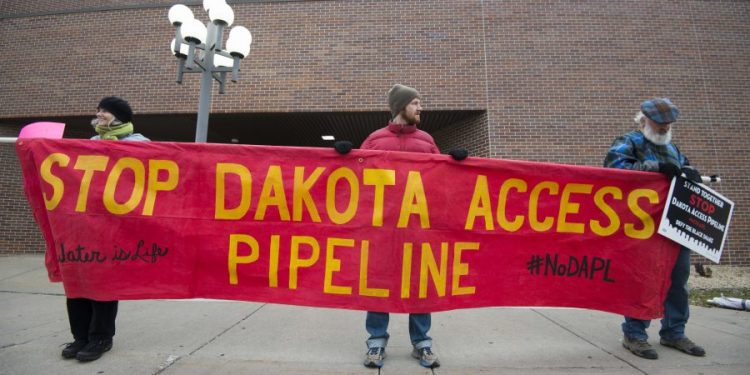By Marcelle Meyer
“I think that right now the Army Corps is examining whether there are ways to reroute this pipeline.” These 18 words make up the most recent statement from President Obama regarding massive groups in North Dakota protesting the construction of the Dakota Access Pipeline (DAPL), on the grounds that it would be environmentally and culturally detrimental to Standing Rock Sioux Reservation there. As of Dec. 6, the Army Corps has denied a permit for the construction of a key part of the DAPL.
Based on a compilation of Facebook posts from protestors at the site and relatively insufficient news coverage of the situation on the ground, we currently know that protestors have been hosed and teargassed by police on the scene, that the state is attempting to block access to food and medical care to the protestors and that those arrested are being kept in temporary “holding cells,” which have been described as animal cages by those incarcerated. Based on this information, our president “thinks” that the Army Corps was “examining” other options. One might read this statement and assume it is a bland, pre-written response to a negotiation between the environmental lobby and White House officials — not a reaction to one of the greatest infringements on indigenous rights in recent years.
The treatment of protestors has been a topic of national debate since the Black Lives Matter movement began protesting police violence on a large scale. Protests in Ferguson, Missouri were just the beginning of a conglomeration of protests not only against police violence and now the Dakota Access Pipeline. President Obama has many reasons to take a stronger stance on the human rights violations and arguably illegal actions taken against DAPL protestors.
President Obama was one of the actors vehemently rejecting the building of the Keystone XL pipeline because of environmental concerns. Interestingly enough, the U.S. Army Corps of Engineers also rejected DAPL in Bismarck because of concerns about it crossing too many water lines (though Snopes debunked the rumor that it was the “predominately white” residents protesting the pipeline).
It is simply morally objectionable that these same concerns would not be projected onto a piece of land that is arguably more significant because it is owned by a supposedly autonomous yet extremely marginalized group with deep-rooted cultural history in the land.
Obama is also in a position in which he has the unique opportunity to speak out about these abuses, since he no longer needs high approval ratings President Obama has the ear of the nation with less consequence, and in a political climate of discrimination and fear of minority rights, it is imperative to take an aggressive stance against these abuses. After eight years of national reform and representation of those most oppressed in this country, now is not the time for half-hearted discourse about what could be one of the greatest conflicts of the decade.





